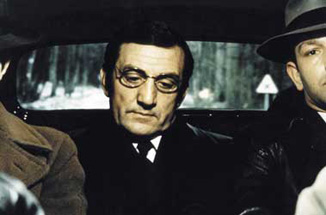|
|
L'Armee des Ombres DVD reviewBy John SealMarch 8, 2007
Melville, whose own wartime experiences in the Maquis deeply informed this film, frequently saw his work sink into oblivion on both sides of the Atlantic. With the notable exceptions of Bob le Flambeur (1955) and (arguably) Le Cercle Rouge (1970), his films have seen limited or no distribution in Anglophone territories. I have no personal knowledge of his other films — even the renowned nouvelle vague gangster epic Le Samourai has so far evaded me — but it's obvious from these three crime films that Melville used his art to examine his own feelings about his time spent in the underground. As renowned critic David Thomson astutely noted in his New Biographical Dictionary of Film, Melville "subtly turns the (criminal) underworld into the Resistance." In the eyes of the authorities, the protagonists in each of these films are villains, and counter-intuitively, that's most true of those in L'Armee des Ombres. The poker-faced Ventura's Phillippe is particularly memorable, his incautious loyalty to the cause matched only by that of Signoret's Mathilde, and Paul Meuresse is riveting in a small but critical role as the unseen controller of Gerbier's cell. Shot by Pierre Lhomme (King of Hearts, Le Divorce) and Walter Wottitz (John Frankenheimer's The Train), the film is suffused in cold steel blues that will have you shivering in empathy on your sofa. This is a film that feels frigid, damp, and musty. Eager to see this much heralded feature and impatient as always, I whetted my appetite with a bare-bones Spanish DVD entitled El Ejercito de las Sombres. Though perfectly respectable in terms of print quality, this disc includes nothing more than the film itself, the original French trailer, and a not terribly interesting photo gallery. L'Armee des Ombres has since had a far more respectful release courtesy the British Film Institute, which features the same pristine print as well as an English-language commentary by Melville expert and Sight and Sound contributor Ginette Vincendeau, a 1945 documentary entitled Le Journal de la Resistance with narration by Noel Coward, a brief contemporaneous segment shot while the film was in production, and a nice booklet that reproduces Cahiers du Cinema's original review. The bulk of these features will also be included on Criterion's double disc set, but if you can't wait a moment longer and have a multi-format machine, the BFI disc is the way to go.
|

|
|
|

|
Saturday, April 27, 2024
© 2024 Box Office Prophets, a division of One Of Us, Inc.


